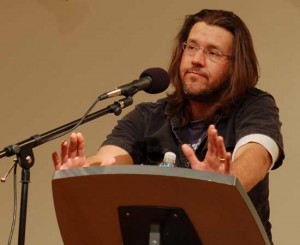Here’s a little snippet that got me started on this idea:
If you didn’t take the time out of your day to watch that short video, you should go back now! But if not, here’s a synopsis of what Mr. Wallace had to say. He is generally wondering about fiction and its ever evolving state, specifically in relationship to the Information Age. Interestingly, though, the modern world has in some sense moved out of the Information Age into the Internet Age.
Of course, “Internet Age” and “Information Age” are really very little more than arbitrary names that describe general trends of the time. However, the distinction between these two starts to develop more significance when we think of how much the world has changed in the last 75 years, even the last 40. Here Wallace, one of the premier figures in modern fiction, is speaking in 1996, right at the genesis of The Internet Age, and his primary reference point is television. For him growing up, information was transmitted via television. As he points out though, television exceeded its initial utilitarian, information spreading purposes and found itself somewhere in the grey space between what is art and what is not. He muses “I was raised to view television as more or less my main artistic snorkel to the universe, and I think television, which is a commercial art, that’s a lot of fun, that requires very little of the recipient of the art, I think effects what people are looking for in various kinds of art.” 
OK, whoa.
The gist of what Wallace is saying isn’t all that new. The Information Age has clearly shaped the way people consume art and related content. This is even apparent at the macro level: TV replaced newspapers, and now Online media is challenging TV. Wallace’s question, though, ends up being more about the state of literature in relationship to these changes than popular media.
In his place as a bestselling, popular fiction writer, Wallace wonders at the way his style has responded to the information age, especially as it relates to the mass consumption mechanism of television. “What’s interesting to me is that the very phenomenon that demographically perhaps cuts into our audience is a big part of what’s going on in the country that I think fiction writers are trying to capture in some way.”
So the programming that is keeping people glued to the television and away from books is what Wallace cites as the inspiration for the density of his work, arguably the feature that makes them most enjoyable.
Fast forward a few years, it is worthwhile to start looking at the type of writing that has become popular since Wallace’s interview, since the Internet Age has really taken hold.
Here’s another clip, this one from another fiction writer, George Saunders, whose collection “Tenth of December” was published in 2013.
Ironically, the clip is from Saunder’s visit to Google, that company which by now has come to distinguish itself as the symbol of the Internet’s role in our lives.
After listening to the first few minutes, where he talks about his own cultural touchstones and begins reading from his own story “Escape from Spiderhead,” I can’t help but wonder if “Spiderhead” doesn’t bear some sort of resemblance to a symbolic representation of Google headquarters.
ENGL 340 for me so far has been much more a game of letting technology respond to literature. Here I attempted to begin a discussion of the question on the other side: how has modern fiction been responding to The Internet?
